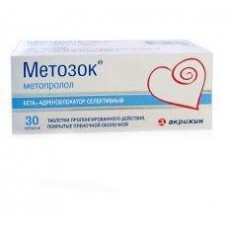Expiration date: 06/2025
Composition
Metoprolol succinate 25 or 100 mg
Packaging
30 PCs
Pharmacological action
Metozoc - cardioselective beta1-blocker. Has no membrane stabilizing action and has no intrinsic sympathomimetic activity. Has antihypertensive, antianginal and antiarrhythmic action.
Blocking in low doses beta1-adrenergic receptors of the heart, reduces catecholamines stimulated the formation of cyclic adenosine monophosphate (camp) from adenosine triphosphate (ATP), reduce intracellular calcium ion current, has a negative Chrono-, dromo-, batmo - and inotropic effect (slows the heart rate (HR), inhibits conduction and excitability, reduces myocardial contractility).
Total peripheral vascular resistance (OPSS) in the early use of beta-blockers (in the first 24 hours after oral intake) increases (as a result of reciprocal increase in activity of alpha-adrenergic receptors and eliminate stimulation of beta2?adrenergic receptors), which, through 1-3 day returns to the source, and prolonged assignment is reduced.
The antihypertensive action is due to a decrease in minute volume of blood flow and synthesis of renin, inhibition of the renin-angiotensin-aldosterone system (has a greater significance in patients with baseline hypersecretion of renin) and the Central nervous system, restoration of the sensitivity of baroreceptors of the aortic arch (does not enhance their activity in response to decreased blood pressure (BP) and eventually a decrease in peripheral sympathetic influences. Reduces high blood pressure at rest, during physical exertion and stress. The antihypertensive effect lasts more than 24 hours.
Antianginalny effect is determined by the requirements decrease myocardial oxygen due to reduction in heart rate (lengthening of diastole and improved myocardial perfusion) and contractility, as well as decreased sensitivity of the myocardium to the effects of sympathetic innervation. Reduces the number and severity of angina attacks and increases exercise capacity. By increasing end-diastolic pressure in the left ventricle and increase the tension of the muscle fibers of the ventricles can increase oxygen demand, especially in patients with chronic heart failure (CHF).
Antiarrhythmic effect is due to the elimination of arrhythmogenic factors (tachycardia, increased activity of the sympathetic nervous system, increased camp content, arterial hypertension), decrease in speed spontaneous initiation sinusnogo and ectopiceski drivers rhythm and slow atrioventricular (AV) conduction (mainly in the antegrade and to a lesser extent in the retrograde directions through the AV node) and on additional ways.
With supraventricular tachycardia, atrial fibrillation, sinus tachycardia with functional heart disease and thyrotoxicosis slows the heart rate or may even lead to the restoration of sinus rhythm.
Prevents the development of migraine.
Unlike nonselective beta-blockers when administered in high therapeutic doses has a less pronounced effect on bodies containing beta2-adrenergic receptors (pancreas, skeletal muscle, smooth muscles of peripheral arteries, bronchi and uterus) and on carbohydrate metabolism, the severity of the atherogenic actions is not different from the action of propranolol. With many years of admission reduces the concentration of cholesterol in the blood. When used in high doses (more 100 mg/day) exerts a blocking effect on both subtypes of beta-adrenergic receptors.
Testimony
Hypertension.
Chronic heart failure II-IV functional class NYHA classification in the stage of compensation (in the complex therapy).
Coronary heart disease: prevention of attacks of stable angina, reduce mortality and frequency of repeat myocardial infarction after the acute phase of myocardial infarction.
Of arrhythmias, including supraventricular tachycardia, a reduction in the frequency of ventricular contraction during atrial fibrillation and ventricular extrasystoles.
Functional cardiac abnormalities, accompanied by tachycardia.
Prevention of migraine attacks.
Contraindications
Hypersensitivity to metoprolol and other beta-blockers, cardiogenic shock, AV blockade II-III degree, sinoatrialnaya blockade, syndrome weakness of the sinus node, bradycardia (heart rate less than 50 beats/min), acute heart failure or CHF decompensation, hypotension (systolic BP less than 100 mm Hg. century), acute myocardial infarction (heart rate less than 45 beats/min, PQ interval is more 0.24 percent, systolic blood pressure less than 100 mm Hg. calendar), lactation, concomitant use of monoamine oxidase inhibitors (MAOIs) or simultaneous in/with the introduction of verapamil, pheochromocytoma (without the simultaneous administration of alpha-blockers), age 18 years (effectiveness and safety have not been established), lactase deficiency, lactose intolerance, glucose-galactose malabsorption, severe asthma, severe violations of peripheral blood circulation.
Application of pregnancy and breastfeeding
During pregnancy, the drug Metozoc® should be applied only according to strict indications, when the expected benefit to the mother outweighs the potential risk to the fetus/baby (in connection with the possible development of a newborn bradycardia, reduced blood pressure, hypoglycemia and respiratory paralysis). In doing so, a careful monitoring especially during fetal development. Cease treatment for 48-72 hours before delivery. If this is not possible, the newborn needs to be under careful observation for 48-72 hours after birth.
The use of the drug Metozoc® is contraindicated in lactation, if necessary use of the drug during lactation, breastfeeding should be discontinued.
Method of application and doses
Metsoc® is intended for oral use 1 time a day, it is recommended to take in the morning, without chewing, drinking water. Metsoc® can be taken with or without food. To prevent bradycardia, the dose picked individually, and increase gradually.
In hypertension and angina pectoris the initial dose of 50 mg 1 time a day, if not therapeutic effect daily dose can be increased up to 100-200 mg per day. In hypertension, the ineffectiveness of the drug in a dose of 100-200 mg per day, you can add another antihypertensive.
In chronic heart failure II functional class NYHA classification (without exacerbations in the last 6 weeks and no change in complex therapy in the last 2 weeks) the recommended initial dose 25 mg once a day. In two weeks the daily dose can be increased to 50 mg, then two weeks later to 100 mg two weeks later up to 200 mg.
In chronic heart failure III-IV functional class NYHA classification recommended initial dose first 2 weeks of 12.5 mg of the drug once a day. Perhaps the use of metoprolol in another pharmaceutical form, e.g. tablets 25 mg with valium. In the period of increasing the dose the patient should be monitored, since some patients have symptoms of heart failure may worsen.
After 1-2 weeks the dose may be increased to 25 mg once a day. Then after 2 weeks, the dose may be increased to 50 mg once a day. Patients who tolerate the drug, doubling the dose every 2 weeks to maximum dose of 200 mg once a day.
Secondary prevention of myocardial infarction and cardiac arrhythmia – an initial dose of 100 mg 1 time per day.
In functional cardiac abnormalities, accompanied by palpitations – 50 mg per day, if necessary dose can be increased to 200 mg per day.
Prophylaxis of migraine: 100-200 mg 1 times per day.
Elderly patients, in renal failure or in patients, on hemodialysis, dose adjustment is not required.
Of the liver affect the removal of metoprolol, so you may need to adjust dose depending on clinical condition.
Side effects
Of the cardiovascular system: often- aetiology, orthostatic hypotension (including syncope), cold lower extremities, palpitations, rarely – temporary increased symptoms of heart failure, cardiogenic shock in patients with myocardial infarction, AV blockade of I degree, rarely – violations conductivity infarction, arrhythmia, very rarely – gangrene (in patients with impaired peripheral circulation).
From the Central nervous system: very often – increased fatigue, decrease speed of mental and motor reactions, often dizziness, headache, rarely – paresthesia, convulsions, depression, loss of concentration, drowsiness, insomnia, "nightmarish" dreams, rarely – asthenia, tremor, increased nervous excitability, anxiety very rare: amnesia/memory impairment, depression, hallucinations, myasthenia gravis.
From the sensory organs: rare – impaired vision, dry and/or irritated eyes, conjunctivitis very rarely tinnitus, breach of taste sensations.
From the digestive system: often – nausea, abdominal pain, constipation or diarrhea, rarely – vomiting, rarely – dry mucous membranes of the mouth, abnormal liver function, hepatitis.
With the skin: rarely urticaria, increased sweating, rarely – alopecia; very rarely photosensitivity, exacerbation of psoriasis, psoriasiform skin reactions.
The respiratory system: often – shortness of breath, rarely bronchospasm in patients with bronchial asthma, and rhinitis.
The laboratory parameters: very rarely – thrombocytopenia (unusual bleeding and hemorrhage), agranulocytosis, leukopenia, increased activity of "liver" enzymes, hyperbilirubinemia.
From the endocrine system: often – hypoglycemia (in patients with diabetes mellitus type I), and hyperglycemia (in patients with diabetes mellitus type II), hypothyroid state.
Other: rare – increased body weight, rarely – impotence/sexual dysfunction very rare – arthralgia, thrombocytopenia.
Storage conditions
In dry protected from light place at temperature not exceeding 25 °C.
Shelf life
2 years


